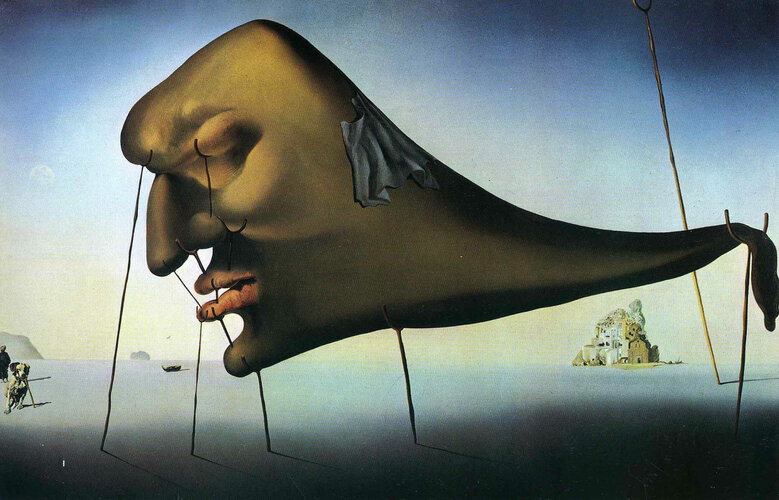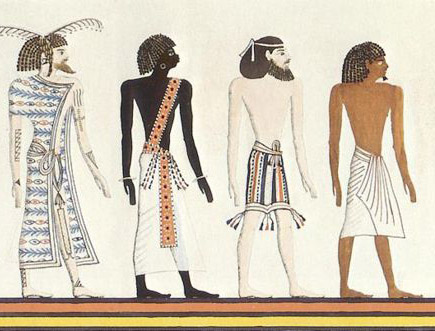[1] The offspring of two Masai will only be recognizable as such to someone culturally prepared to view "Masai" characteristics as Masai. To others they may just look African or even just human.
Do you honestly think that, say, some 12th century Pacific Islander who, when presented with a group of mixed humans made up of ten Masai, ten Bushmen, ten Vikings, ten Aztecs, and ten Mongols wouldn't be able to separate them into the separate groups with a pretty fair rate of success?
[/QUOTE]
What do you mean by "success"? You mean, of course, that your Pacific islander would divide people up the in the same way that YOU would, using the criteria and he groups that YOU take for granted. I think that unlikely.
So, yes, I do honestly think that our islander would group people differently than you would. The historical evidence is, moreover, on my side.
In the 12th century, the groups you specified did not exist and the people you want to put in each would not group themselves that way, much less anyone else. For one thing, “viking” described a job, not a people. A translation faithful to the times would be “doing business”, which sometimes meant trading, sometimes settling, and sometimes looting.
I already mentioned that the Romans did not makes the distinctions that we do. Citizen and barbarian, yes. But you just have to look at enough busts of the notable Romans to note the, to us, "obviously" sub-Saharan features of quite a few of the citizens.
The peoples that succeeded Rome likewise failed to distinguish one another on racial and nationalistic lines. For them, only family ties and personal loyalty to comrades and chiefs mattered. The one-time distinction between “Asiatic” Huns, Alans, and Mongols on the one hand and “Germanic” Goths, Vandals, Franks, and Burgundians on the other existed only in the minds of 19th-century Romantics who were in the process of inventing race and nationality themselves. Archeological and literary evidence both show that the Huns, Mongols, Goths, and Burgundians were what we would call multi-ethnic groups.
When my Danish ancestors went viking to Jerusalem and first encountered sub-Saharan Africans on the cost of Spain, they matter of factly mentioned meeting "blue men" (blue meaning "darker" than they were used to). Since "viking" was a job, not a so-called race or nationality (neither of which yet existed as concepts), some of those blue men might well have joined up and become vikings themselves--as Irish, Germans, and Russians certainly did. The word "Russian," in fact, derives from "Rus", a word that probably means "Swede" or, "loosely, "Viking" and named a multi-ethnic medieval kingdom.
To the medieval German knight-poet Wolfram von Eschenbach, Christianity and Christendom were what mattered. In Parzifal, Muslims are black but turn white when they convert and become part of Christendom. In the 15th- to early 16th-century Mediterranean, on the other hand, most dark-skinned Africans encountered by Europeans were Ethiopian Christians, liberated from slavery in Muslim galleys. In Rome, one of them is memorialized alongside a European slave in a mosaic created to commemorate the founding of the Catholic Trinitarian order. The Trinitarians were founded to raise money and ransom enslaved Christians.
The human gene pool is too thoroughly mixed to allow for significant differences,
Depends on how you define "significant." If milk is an important fraction of your nutrition, being lactose tolerant will be important to you. If you are in a region rife with malaria, being resistant to it will be kinda important to you.
No. It won't be important to you. You will never know one way or another.
Natural selection simply does not work the way you assume. It has nothing to do with what is important to the individual or with the distinctive individual characteristics that make you you (at least in the Romantic imagination). Natural selection is all about statistical distributions of genes in populations across time. In this context, you and I and everyone else that has ever lived are just randomly assembled mechanisms for propagating genes. Mechanisms that work well enough under whatever conditions are current at a given time pass on their genes, which continue to use derived mechanisms. Sickle cell disease is a case in point:
* If one has two unmutated copies of the gene AND IF one lives in a malaria-free area, the probability of passing on genes to descendants is highest (for these conditions).
* If one has two unmutated copies of the gene AND IF one lives in an area where malaria is endemic, the probability of passing on genes to descendants is lower (due to malaria risk).
* If one has two mutated copies of a gene, one develops sickle-cell disease . The probability of passing on genes to descendants is lower, regardless of where one lives.
* If one has one mutated and one unmutated copy of the gene AND IF one lives in an area where malaria is endemic, you are more likely to pass on genes to descendants.
* If one has one mutated and one unmutated copy of the gene BUT lives in a malaria-free area, you are likely to pass on genes to descendants. But your descendants are also a little less likely to pass those genes any further (due to the risk of sickle-cell).
The above means that the present-day distribution of genes in the human population as a whole reflects conditions that affected gene transmission in the past. Anyone anywhere can still get malaria--the sickle cell variant does not guarantee that any individual will not get it and die from it. It just means that there is a statistically greater likelihood that the sickle-cell variant of the gene will survive in populations where large numbers of people were exposed to malaria at particular times in the past.
[3] Deciding which physical characteristics provide survival advantages is a non-trivial task.
Sure. But heart disease and diabetes and cancer and a lot of other maladies are often genetically based, and can be attributed to distinct genetic flaws in an individual that can be passed down. If you could edit them out (reliably, and without meaningful risks to the individual and his/her progeny, something that can only be achieved with practice), you'd have to wonder why you *wouldn't.*
[/QUOTE]
You presume a degree of knowledge that does not exist in real life. As far as I know, are few if any "distinct genetic flaws", nor is it easy to determine when "heart disease and diabetes and cancer" are genetic. Several cancers are, for example, known to be caused by viruses, chemicals, or radiation. Diseases like sickle cell, where the genetics re well established, are the exception, not the rule. EVen then, we know little more than roughly where the mutant gene is located on the chromosomes--like knowing the city but not the house address.
The sickle-cell mutation shows, moreover, the dangers of unintended consequences. If we develop a cure for malaria (malaria drugs are rapidly losing their effectiveness), eradicating the sickle-cell gene might be justified in that it eliminates unnecessary suffering . But, in the absence of a cure, is it OK to eradicate the one mitigating factor protecting much of a population? And what if we at some point find out that the sickle-cell variant gene does other important things? Or that it is not, in fact, involved in sickle-cell disease at all, but merely near to some other gene?
With rare exceptions, the kind of genetic modification that gets glibly discussed is like giving a chimpanzee a hammer and having him tune your Ferrari.He may know what HE is doing, but he almost certainly does not know what the pieces under the hood are doing.
Today, the sickle-cell gene is most common among populations in Africa and central Europe, where malaria was once or still is endemic.
Indeed, yes, thus pointing out that genetic differences between groups *are* there and can be important.
But there are no genetic differences between distinct groups. You are assuming that one set of characteristics defines one "group" in a population. But in fact, all characteristics are statistically distributed across all groups to varying degrees. No one characteristic or set of characteristics of uniquely characterizes a single population.
There is no necessary correlation between the sickle cell mutation and malaria. The sickle-cell mutation is not found in all malarial or formerly malarial regions on earth. Nor is it the only genetic disease of the blood that seems to reduce the prevalence malaria in populations. Malaria was found in most of the wet areas of the earth at one time or other. Yet the sickle-cell mutation is most common among Africans and some South Asians. But it is not as common among African-Americans.
This is why it is important to understand the significance of the fact that all of us are so nearly genetically identical and why what differences there are statistically relatively unimportant. Natural selection has systematically filtered variations in the genome for eons. Most variations either failed to establish themselves in the genome (their carriers did not reproduce) or became the norm--and thus were no longer variations.


